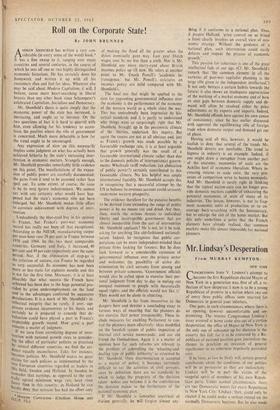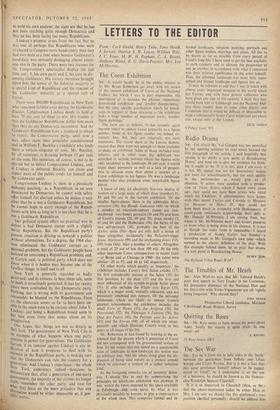Mr. Lindsay's Desperation
From MURRAY KEMPTON NEW YORK
CONGRESSMAN JOHN V. LINDSAY'S attempt to become the first Republican elected Mayor of New York in a generation was, first of all,.a re- flection of how desperate it now is to be a young Republican of promise in a nation where two out of every three public offices seem reserved for Democrats in general your inferiors.
One goes, in such circumstances, where there is an opening, however uncomfortable and un- promising. The interest Congressman Lindsay's essay aroused at home came also out of a certain desperation: the office of Mayor of Ncw York is the only one of substance up for decision in the country this fall: for it to be contested by a' Re- publican of national position gave journalism the chance to proclaim an occasion of general significance in an otherwise hopelessly parochial year. • If he loses, as lose he likely will, certain general conclusions about the conditions of our politics will be as persuasive as they are melancholy: Lindsay will _be in part the victim of the vengeful spirit of members of his own Repub- lican party. Under normal circumstances, there are two Democratic voters for every Republican in New York City.' Lindsay, then, could only be elected if he could make a'serious' inroad 'off the normally Democratic bastions. But he also needs to hold his own enclave; the signs are that he has not been reaching quite enough Democrats and that he has been losing too many Republicans.
Lindsay's promise arises from the fact that he was one of perhaps five Republicans who were re-elected to Congress more handsomely than they had ever been at a time when Senator Goldwater's candidacy was seriously damaging almost every- one else in the party. There were two reasons for the Congressman's spectacular display the last time out : 1, his own parts and 2, his care in dis- owning Goldwater. His victory therefore brought upon him the notice of the Johnson majority as a special kind of Republican and the rancour of the GoldWater minority as a special sort of traitor.
There were 800,000 Republicans in New York who remained faithful even during the Goldwater disaster. Congressman Lindsay needs to hold at least 70 per cent of them to win. His trouble is that the Goldwater Republicans dislike him more than they do any Democratic incumbent. And the Goldwater Republicans have a standard to which to repair; the Conservative party, until now a sect, offers them their principles unadulterated and in William F. Buckley a candidate who lends them a certain elegance of tone. Mr. Buckley, by all estimates, is drawing perhaps 15 per cent of the vote. His intention, of course, is not to be elected but to defeat Congressman Lindsay, and, if Lindsay is defeated, Buckley can claim and expect most of the public credit for himself and the Goldwater spirit.
Congressman Lindsay is, then, in a 'peculiarly unhappy position : as a Republican, in an area dominated by Democrats, he cannot with safety offer himself for election unless he makes it very Clear that he is not a Goldwater Republican, but he cannot hope to carry enough of the Repub- licans with him so long as it is too clear that he is not a Goldwater Republican.
Our political system offers no practical way to defeat a bad Democrat except with a slightly better Republican. But the Republican party's Present situation is driving us towards a politics without alternatives. To a degree, the 1964 elec- tion eliminated the Goldwater current as a national problem; but the Goldwater people have insisted on remaining a Republican problem; and, as Carlyle said, 'a political party which does not know when it is beaten may become one of the fatallest things, to itself and to all: New York is generally regarded as badly governed; and its citizens, to hear them talk, seem to think it atrociously governed. It has for twenty Years been controlled by the Democratic party. Nothing that is wrong with its government can reasonably be blamed on the Republicans. Even SO, the electorate seems so far to have been un- able in the main even to be curious about John V. Lindsay; just being a Republican would seem to bar' him even from that minor claim on its imagination.
One hopes that things are not as dreary as theY look. The government of New York City is an example of what happens when one party remains in power for generations. The Goldwater faction, if its rancour against Lindsay is any in- dication of how it proposes to deal with its enemies in the Republican party, is making sure that the Democrats can rule the country for a generation. And Lindsay's experience--the whole New ew York experience indeed--threatens to demonstrate that, after a generation of one-party 4overnment, the majority of the citizens no longer really remember the other party, and vote for vi t they have on the mere prejudice that any alt what they would be either impossible or, if pos- sible, Worse.































 Previous page
Previous page